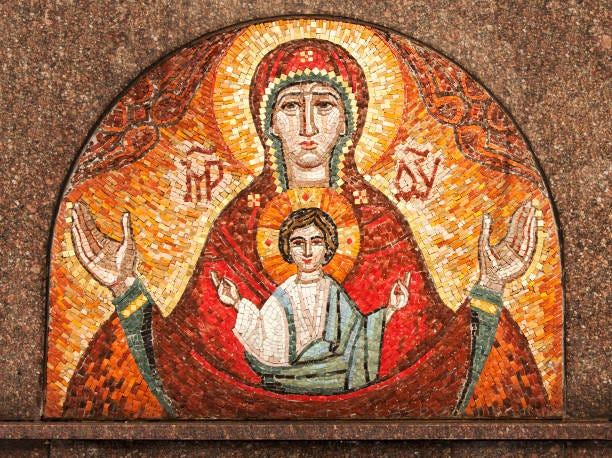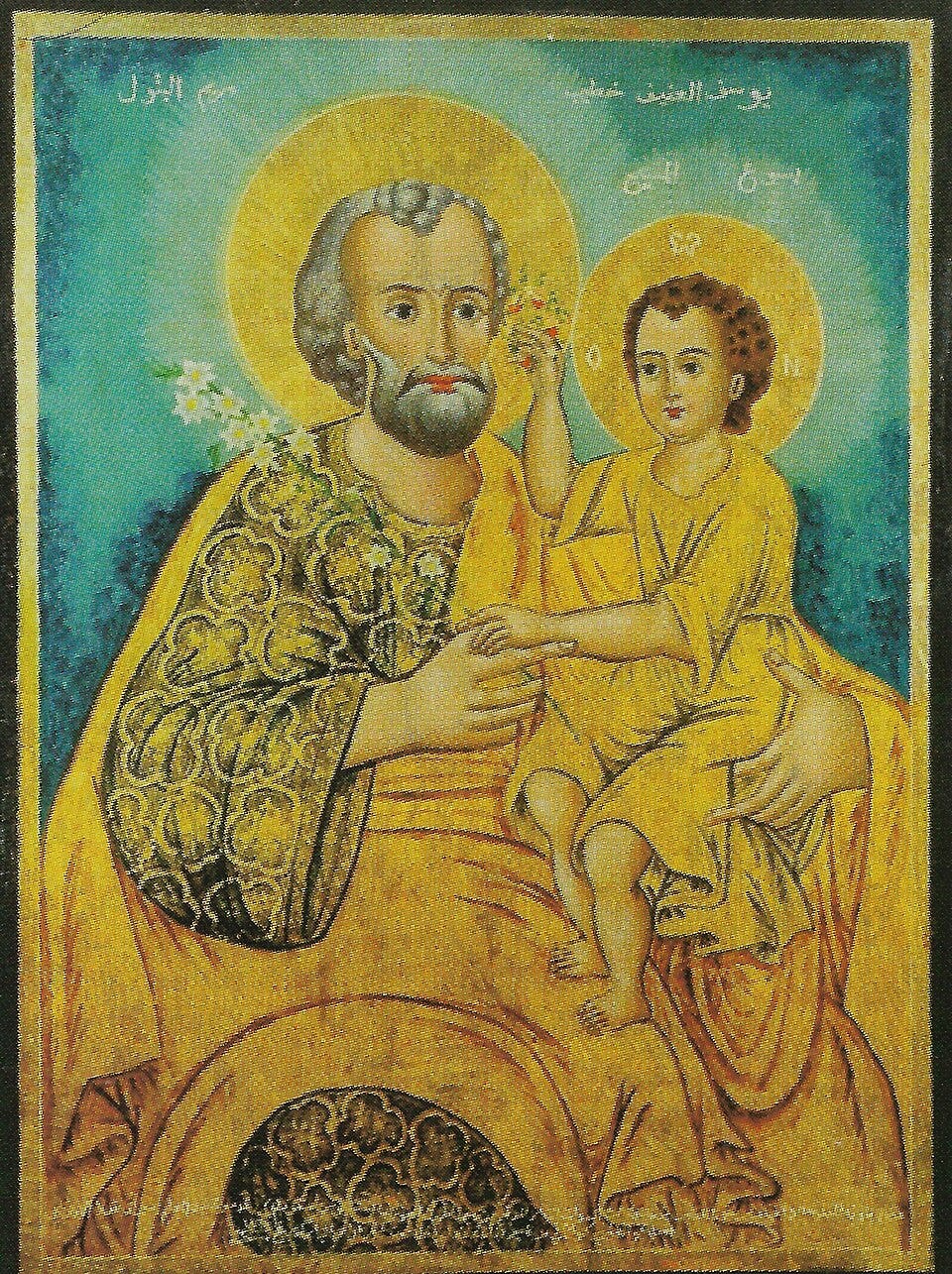Questions from the Mailbag: Was the Theotokos Sinless and a Perpetual Virgin?
Why Orthodox Christianity honors the Christ's Mother as the Panagia ("all-holy") and "Ever-Virgin" Mary
Question: Hey Jamey! My coworker wants to know why the Panagia had to be sinless and a perpetual virgin. If you have references that would be awesome. Of course he brings up Romans 3:23 about everyone having sinned; he’s super nice just surprised at us believing that. Thanks!
The All-Holy Panagia: The Virgin Mary as Sinless?
Thanks for your question! In Orthodox Christianity, we honor the Virgin Mary as the Panagia (the “All-Holy”) not because she was born outside the human condition—unlike her Son, Jesus Christ, she was naturally conceived—but because she lived a life of perfect cooperation with God’s grace. Her sinlessness wasn’t a result of being exempt from humanity’s fallen nature; rather, it stemmed from her unwavering “yes” to God at every moment, culminating in her role as the Theotokos, the “God-bearer.”
As she herself proclaimed during the Visitation, “for he who is mighty has done great things for me, and holy is his name” (Lk. 1:49). Her response to the angel at the Annunciation further reflects this total surrender: “Let it be to me according to your word” (Lk. 1:38). As the mother of the Incarnate Word, she bore God Himself in her womb. Since God is utterly holy and sinless, the vessel chosen to carry Him had to be pure, free from personal sin and any inclination toward it. Her sinlessness was necessary for the mystery of the Incarnation to unfold as God intended. Regarding Romans 3:23—“for all have sinned and fall short of the glory of God”—the Orthodox Church interprets this as a general truth about humanity’s fallen state, not an absolute rule without any exception.
Christ Himself, fully human yet sinless, is the most obvious exception. Mary, while not divine by birth, is understood as a unique case in salvation history, greeted by the angel as “full of grace” (Luke 1:28). She was not exempt from needing salvation but was fully saved and sanctified through her relationship with her Son and her complete surrender to God’s will.
It was meet that she who contained Him that fills all things and who surpasses all should outstrip all and become by her virtue superior to them in the eminence of her dignity. Those things which sufficed the most excellent among men that have lived throughout the ages in order to reach such excellency, and that which all those graced of God have separately, both angels and men, she combines, and these she alone brings to fulfillment and surpasses. And this she now has beyond all: That she has become immortal after death and alone dwells together with her Son and God in her body. For this reason she pours forth from thence abundant grace upon those who honor her-for she is a receptacle of great graces-and she grants us even our ability to look towards her. Because of her goodness she lavishes sublime gifts upon us and never ceases to provide a profitable and abundant tribute in our behalf. If a man looks towards this concurrence and dispensing of every good, he will say that the Virgin is for virtue and those who live virtuously, what the sun is for perceptible light and those who live in it. But if he raises the eye of his mind to the Sun which rose for men from this Virgin in a wondrous manner, the Sun which by nature possesses all those qualities which were added to her nature by grace, he shall straightaway call the Virgin a heaven. The excellent inheritance of every good which she has been allotted so much exceeds in holiness the portion of those who are divinely graced both under and above heaven as the heaven is greater than the sun and the sun is more radiant than heaven.

Mary as the New Tabernacle and Holy of Holies
The Holy Fathers often liken our Mary to the Tabernacle and the Holy of Holies from the Old Testament, set apart for the special indwelling presence of God. In Exodus, the Tabernacle is prepared according to God’s strict instructions, and when it is finished, we read:
Then the cloud covered the tent of meeting, and the glory of the LORD filled the tabernacle. Moses was not able to enter the tent of meeting, because the cloud settled upon it, and the glory of the LORD filled the tabernacle. (Ex. 40:34-35)
This prefigures what happens at the Annunciation:
“And the angel answered her, ‘The Holy Spirit will come upon you, and the power of the Most High will overshadow you; therefore the child to be born will be called holy, the Son of God.’” (Lk. 1:35)
Mary, as the living Ark of the New Covenant, carried God Incarnate in her womb. Just as the Tabernacle had to be spotless to house God’s presence, Mary’s purity—both in body and soul—was essential. Nothing less could contain God Himself.
Her perpetual virginity is a result of her total consecration to God: as the Holy of Holies was never to be defiled or used for any other purpose, so Mary remained set apart solely for God’s sacred plan. Her body became the very home of God, fulfilling the Old Testament imagery in the truest and fullest sense.
The Perpetual Virginity of the Theotokos
Mary’s perpetual virginity is not merely a detail of her life but a profound symbol of her unique role in salvation history and her total dedication to God. She was chosen to be His dwelling place, and no other human relationship could alter or diminish this highest of callings.
The Orthodox Church teaches that Mary’s womb, having borne the Son of God, was permanently sanctified. To bear other children would be inconsistent with the miraculous and singular nature of Christ’s Incarnation. This belief is ancient, rooted in the early Church’s understanding of her absolute consecration.
After the Annunciation, she proclaims:
“For behold, henceforth all generations will call me blessed” (Luke 1:48).
Scripture and Tradition offer helpful insights into this teaching. Ezekiel 44:2, which speaks of a gate of the sanctuary that remains sealed, was interpreted by many Church Fathers as a prophecy of Mary’s perpetual virginity:
And the LORD said to me, ‘This gate shall remain shut; it shall not be opened, and no one shall enter by it, for the LORD, the God of Israel, has entered by it. Therefore it shall remain shut.’ (Ezekiel 44:2)
Her body, as the gate through which God entered the world, remained sealed to all others. As St. John of Damascus saw her as the cherubic throne—after all, the Lord and God of all “overshadowed” her: “Rejoice, throne of God, glorified and pure; Rejoice, spacious palace,” he wrote.
Support from Scripture and the Church Fathers
Saint Gregory the Miracle-Worker wrote of the Virgin:
For in your arms the Creator of all things shall be carried. And she was perplexed by this word; for she was inexperienced in all the addresses of men, and welcomed quiet, as the mother of prudence and purity; (yet) being a pure, and immaculate, and stainless image herself, she shrank not in terror from the angelic apparition, like most of the prophets, as indeed true virginity has a kind of affinity and equality with the angels. For the holy Virgin guarded carefully the torch of virginity, and gave diligent heed that it should not be extinguished or defiled.
Let’s summarize the key scriptural references that illuminate these teachings:
Luke 1:35 – “The Holy Spirit will come upon you, and the power of the Most High will overshadow you; therefore the child to be born will be called holy, the Son of God.”
The Holy Spirit’s overshadowing of Mary is prefigured by God’s presence filling the Tabernacle—as God’s chosen vessel, she was pure.
Exodus 40:34-35 – “Then the cloud covered the tent of meeting, and the glory of the LORD filled the tabernacle.”
The sanctity of the Tabernacle prefigures Mary’s sinlessness as the new dwelling place of God.
Ezekiel 44:2 – “This gate shall remain shut; it shall not be opened, and no one shall enter by it, for the LORD, the God of Israel, has entered by it. Therefore it shall remain shut.”
As mentioned, this prophetic image of the sealed gate is seen by the Church as pointing to Mary’s perpetual virginity.
Luke 1:28 – Even the angels praise her: “And he came to her and said, ‘Hail, O favored one, the Lord is with you!’”
Luke 1:48-49 – Mary’s own words confirm her unique holiness, recognized by all generations:
“For behold, from now on all generations will call me blessed.”
“For he who is mighty has done great things for me, and holy is his name.”

A Note on Joseph, the Betrothal, and the Cross
A related point worth mentioning, as it often raises questions, is the nature of Mary’s betrothal to Joseph. In Orthodox Tradition, this was not an ordinary engagement leading to a typical marital life. Mary, being young, needed a protector, and Joseph, an older widower with children from a prior marriage, was chosen for this role.
This understanding helps explain why, from the Cross, Jesus entrusts His mother to the care of the Apostle John rather than to any supposed younger siblings:
“When Jesus saw his mother and the disciple whom he loved standing nearby, he said… ‘Woman, behold, your son!’” (John 19:26).
If Mary had borne other children younger than Jesus, as many Protestants suggest, why would Christ, in His final moments of earthly agony, need to assign a caretaker to His mother?
In the cultural context of the time, it would have been the natural duty of her own sons to care for her, especially after the loss of their eldest brother.
And where were her supposed other children when Christ was on the cross?
The absence of any siblings at this critical juncture—and Jesus’s deliberate act of entrusting Mary to John—is strong supportive testimony to the Orthodox belief in her perpetual virginity. No other children of Mary are mentioned anywhere in Scripture as being present to take on this responsibility. It makes the most sense of the data that she had no other direct offspring of her own.
Moreover, this act from the Cross reveals a deeper spiritual truth for Orthodox Christians. The Church understands that Jesus not only ensures Mary’s earthly care but also symbolically entrusts her to the Church through John, the beloved disciple, establishing her as the spiritual mother of all believers.
In conclusion, Joseph’s role, therefore, was never that of a husband in the ordinary sense, but was that of a guardian, preserving Mary’s consecration to God and her unique vocation. Arguably, this moment at the Cross confirms both her perpetual purity and her universal motherhood, as she becomes a source of comfort and intercession for all who follow Christ.
In Essence: A Holy Dwelling for God
Ultimately, Mary’s sinlessness and perpetual virginity are not just about her personal piety but about her irreplaceable role in God’s redemptive plan. She is the holy dwelling place of God, set apart in purity and fullness of grace, mirroring the sanctity of the Holy of Holies and the Ark of the Covenant. Her life points us to the mystery of the Incarnation—God becoming man through her willing obedience and unique calling.
So it’s no surprise we hold a deep reverence for the Theotokos. If you have more questions about Mary, the saints, or any aspect of the faith, drop them in the comments or send them my way—I’d love to explore them in future posts.
Until next time, may the intercessions of the Panagia guide us all closer to her Son!
For further exploration:


